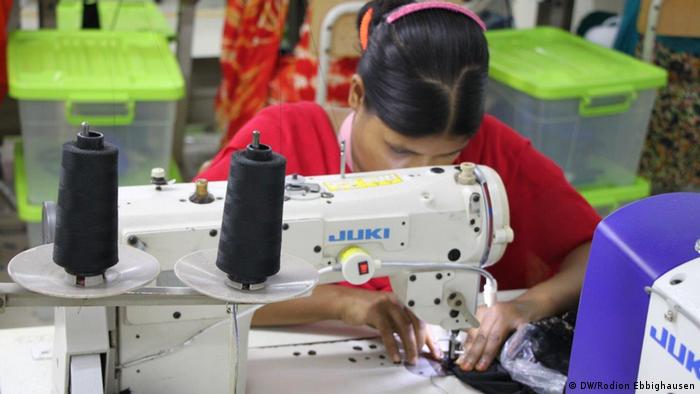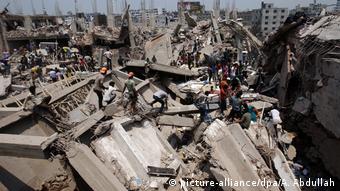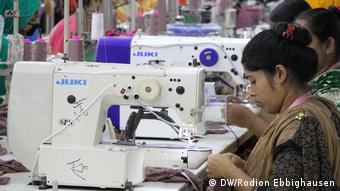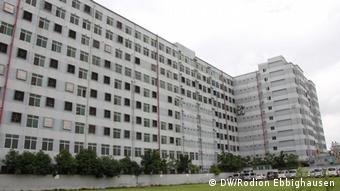Since the collapse of Rana Plaza, with more than 1000 dead has done in the textile sector in Bangladesh much. During the work, safety was improved, a trade Union movement for the future.

The images of the disaster went around the world: On the Morning of the 24. April 2013 buried tons of concrete and steel, more than 3,000 Textile workers and laborers. 1135 of them died. Many of the Survivors suffered severe injuries. The man-made disaster highlighted the price the mass consumption of cheap clothes in the West brings.
Since then, a variety of initiatives, such as, for example, the “Accord on Fire and Building Safety in Bangladesh”, a voluntary Association of global brands, retailers and trade unions, have done much for the safety of the factories. Also Tuomo Poutiainen, the country Director of the International labour Agency (ILO) confirmed in discussions with Deutsche Welle: “The safety of the workers in the industry today is, without a doubt, much better, especially in the export-oriented textile industry.”

The disaster of Rana Plaza, the textile industry is changing in Bangladesh. The South Asian country is today, compared to other developing countries, a pioneer in the occupational safety
To complain about when it comes to safety nothing
The majority of the improvements related to fire protection, building and occupational safety. There are significantly more controls and more clearly defined Standards. This also proves a showcase factory in the West of Dhaka, located district of Gazipur, who was able to visit the Deutsche Welle in July 2019. Depending on traffic, one to two hours from the city centre of Dhaka removed the ten-storey factory in which around 6,000 Textile workers produce for the Hong Kong company Hop Lun especially underwear is. Retail brands such as H&M, Primark, C&A and others.
The factory was built in 2014. The squeaky-clean building makes a solid impression. The huge diesel generators are placed, as the law requires, in addition to the factory. Clear escape routes, fire extinguishers and fire alarm systems identified are sufficiently available. There is a Babysitting service, two Doctors are working on a small infirmary, and it is even offered a free lunch in the huge cafeteria.
In the case of technology and equipment of the factory there is nothing to complain about, and also the state inspectors of the “Department of Inspection for Factories and Establishments” (DIFE), which could accompany the DW in the case of an inspection, find hardly any faults.

Urmi, Shopon and Halima (v. l. n. r.) is a set successful for the workers
Self-elected workers ‘ representation as a novelty
A further feature of the exception factory: The workers are organized. For almost two years, there is a works Council. Prior to that, the rights of the employees were represented by a so-called working Committee, the members of the Executive Committee named.
As the workers demanded the staff Council, led reported initially to strong tensions with the Executive Board, as Urmi, Shopon and Halima by the works Council compared to the DW. The Management sent intimidating letters home, and threatened with termination. “We were afraid to go home,” says the spokesperson for Urmi. But with the support of the employees, who are all now members of the Union, could be the establishment of an independent labor representation by set. To do this, you need to know: The trade Union is not a company limited is a branch trade Union according to the Western pattern.
Their Initial Distrust
The Board was scared, again, at that time, the outside interference and incitement of the workers, such as Mohammad Atif Chowdhury, the head of the personnel Department explained to the DW. After the works Council had been established with the support of the workers, however, felt this initially overpowering, so Chowdhury. “They thought they were about the Management and the personnel Department.”

Occupational safety has improved significantly. But Overtime remains the rule
But then both sides would have gotten together. In tough negotiations, the management and works Council have agreed on a two-year plan, in which the main demands are written. For example, a larger daycare center. “It’s about finding a Balance,” says Chowdhury.
“Good for productivity”
After initial skepticism, has set itself on the part of the Executive management the insight that a works Council offers quite advantages. “Finally, we get the information from the workforce that we need. The Management can make better decisions,” says Chowdhury. Of course, the works Council make the problems sometimes bigger than they are in reality, but he’ll make us aware of problems that otherwise would have remained unnoticed. “I think this is good for the efficiency of the production.”

In the canteen of the factory of Hop Lun, the 6,000 workers will receive a lunch
Also, the representatives of the employees are visibly proud of. “I’m not very cultured,” says Urmi, “because I have attended school only up to eighth grade, but I think we do a good Job. It’s fun and I want to continue to make.”
The Manager, who fought at the time of the founding vehemently opposed to the representation of employees, have left the company now. Today, the works councils describe the climate as constructive, even if the disputes about for more pay to stay hard.
Trade Union movement at the beginning of
The benefits of employee representation and trade Union Organisation you do not need to convince Tuomo Poutiainen of the ILO in the first place. “The workers must have a voice. Without it there can be no permanent, secure and fair work environment.” Because even if Bangladesh after the Rana Plaza remarkable advances in safety have made, the social rights of workers, often in deficit. The wages are low, sexual harassment in the workplace remains a Problem.

The factory of Hop Lun was built in 2014. The company has invested twelve million dollars in the building with ten floors
There is a lack of trust between workers and employers, says Poutiainen. The country had no history of social Dialogue, and although since 2013, more than 500 trade unions were founded, are only a few of them really active. This is also true for the trade unionists in the work of Gazipur. They operate largely in isolation and have only councils to the factories or operation.
Transparency note: The article was written following a research trip with the German society for the United Nations to Bangladesh.

